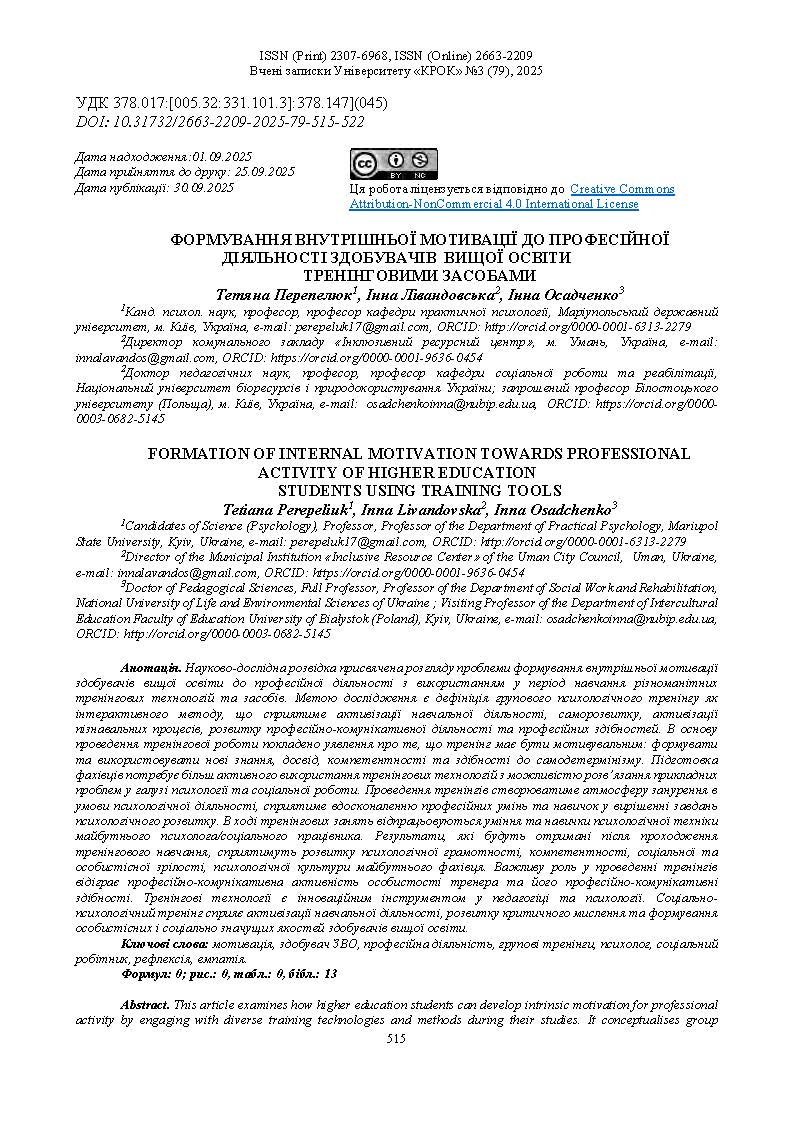ФОРМУВАННЯ ВНУТРІШНЬОЇ МОТИВАЦІЇ ДО ПРОФЕСІЙНОЇ ДІЯЛЬНОСТІ ЗДОБУВАЧІВ ВИЩОЇ ОСВІТИ ТРЕНІНГОВИМИ ЗАСОБАМИ
DOI:
https://doi.org/10.31732/2663-2209-2025-79-515-522Ключові слова:
мотивація, здобувач ЗВО, професійна діяльність, групові тренінги, психолог, соціальний робітник, рефлексія, емпатіяАнотація
Науково-дослідна розвідка присвячена розгляду проблеми
формування внутрішньої мотивації здобувачів вищої освіти до професійної
діяльності з використанням у період навчання різноманітних тренінгових
технологій та засобів. Метою дослідження є дефініція групового
психологічного тренінгу як інтерактивного методу, що сприятиме активізації
навчальної діяльності, саморозвитку, активізації пізнавальних процесів,
розвитку професійно-комунікативної діяльності та професійних здібностей. В
основу проведення тренінгової роботи покладено уявлення про те, що тренінг
має бути мотивувальним: формувати та використовувати нові знання, досвід,
компетентності та здібності до самодетермінізму. Підготовка фахівців
потребує більш активного використання тренінгових технологій з
можливістю розв’язання прикладних проблем у галузі психології та соціальної
роботи. Проведення тренінгів створюватиме атмосферу занурення в умови
психологічної діяльності, сприятиме вдосконаленню професійних умінь та
навичок у вирішенні завдань психологічного розвитку. В ході тренінгових
занять відпрацьовуються уміння та навички психологічної техніки
майбутнього психолога/соціального працівника. Результати, які будуть
отримані після проходження тренінгового навчання, сприятимуть розвитку
психологічної грамотності, компетентності, соціальної та особистісної
зрілості, психологічної культури майбутнього фахівця. Важливу роль у
проведенні тренінгів відіграє професійно-комунікативна активність
особистості тренера та його професійно-комунікативні здібності. Тренінгові
технології є інноваційним інструментом у педагогіці та психології. Соціально-
психологічний тренінг сприяє активізації навчальної діяльності, розвитку
критичного мислення та формування особистісних і соціально значущих
якостей здобувачів вищої освіти.
Завантаження
Посилання
Грінчук, О. І. (2012). Проблема оптимізації комунікативної підготовки майбутніх спеціалістів засобами соціально-психологічного тренінгу. Актуальні питання психології. Київ : Інститут психології імені Г. С. Костюка НАПН України. Т. ХІV, 2, 67-74.
Долинська, Л. В. (2021). Особистісне професійне зростання: психологічні тренінги К.: Каравела. 560 c.
Зливков, В. Л., & Лукомська, С. О. (2019). Теорія та практика психологічних тренінгів. Київ-Ніжин : Видавець ПП Лисенко М. М. 209 с.
Карамушка, Л. М. (2019). Тренінг «Психологічна підготовка персоналу освітніх організацій до розвитку підприємницької активності та соціальної мобільності»: структура, зміст, особливості використання. Актуальні проблеми психології: Організаційна психологія. Економічна психологія. Соціальна психологія. Київ : Інститут психології імені Г. С. Костюка НАПН України. Вип. 54, 76-85.
Карпенко, Є. (2015). Основи психотренінгу: навч. пос. Дрогобич. 78 с.
Климчук, В. О. (2006). Тренінг внутрішньої мотивації: результати апробації та структура. Практична психологія та соціальна робота, 10, 52-59.
Мілютіна, К. Л. (2004). Теорія і практика психологічного тренінгу: навч. посіб. Київ : МАУП, 192 с.
Нікітіна, І. В. (2016). Мотиваційний тренінг у процесі професійної підготовки фахівців. Гуманітарний вісник ДВНЗ «Переяслав-Хмельницький державний педагогічний університет імені Григорія Сковороди». Вип. 36, Том III (19). К. : Гнозис, 158-165.
Білінська, О. О, Василевська, О. І., & Гриньова, О. М. (2017). Особистісно-професійне зростання: психологічні тренінги. К. : Каравела, 559 c.
Федорчук, В. М. (2004). Соціально-психологічний тренінг «Розвиток комунікативної компетенції викладача» : навч.-метод. пос. Кам’янець-Подільський : Абетка, 240 с.
Яценко, Т. С. (2022). Активне соціально-психологічне навчання: теорія, процес, практика. Хмельницький : Вид-во НАПВУ, 792 с.
Deci, E. L., & Ryan, R. M. (2008). Self-Determination Theory: A macrotheory of human motivation, development, and health. Canadian Psychology/Psychologie Canadienne, 49, 182-185.
Ryan, R. M., Patrick, H., Deci, E. L., & Williams, G. C. (2008). Facilitating health behaviour change and its maintenance: Interventions based on self-determination theory. The European Health Psychologist, 10, 2-5.

Downloads
Опубліковано
Як цитувати
Номер
Розділ
Ліцензія

Ця робота ліцензується відповідно до Creative Commons Attribution-NonCommercial 4.0 International License.

